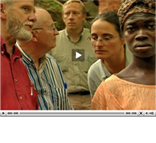

Press release on Emmy Nomination and first family’s visit to Cape Coast Castle, Ghana
Posted July 13th, 2009 by James DeWolf PerryFOR IMMEDIATE RELEASE
Thursday, July 16, 2009
CONTACT:
Katrina Browne, Producer/Director, Traces of the Trade: A Story from the Deep North
Office: 617-349-0019; cgibson@tracesofthetrade.org
Holly Cowan, PR Collaborative
Office: 202-339-9598; holly@prcollaborative.com
DESCENDANTS OF LARGEST SLAVE-TRADING FAMILY IN U.S. HISTORY COMMENT ON OBAMAS’ VISIT TO CAPE COAST CASTLE, GHANA
The President and First Lady’s visit to Cape Coast Castle has troubling personal resonance for the descendants of the DeWolf family from Rhode Island. From 1770-1820, three generations of DeWolfs created a slave-trading dynasty, making them responsible for bringing more Africans to the Americas than any other U.S. family. Documents show that James DeWolf, the family’s “leading” slave trader came specifically to Cape Coast Castle (among other forts) to purchase human cargo.
IN FILM, FAMILY HIGHLIGHTS THAT IT WAS NORTHERN SHIPS THAT PRIMARILY CONDUCTED THE U.S. TRANSATLANTIC SLAVE TRADE
At the invitation of DeWolf descendant and first-time filmmaker Katrina Browne, 9 relatives joined her to retrace their family’s triangle trade on camera, from Rhode Island to Ghana to Cuba. The resulting film Traces of the Trade: A Story from the Deep North uncovers the vast extent of Northern complicity in slavery, contrary to widespread amnesia about that role.
Producer/Director Katrina Browne: What most Americans don’t realize is that it was Northern merchants who were largely responsible for the slave trade, not Southern ones.
Family member James DeWolf Perry: It was Northern ships, with Northern trade goods, and Northern financing that propelled the slave trade. The North sent out 85% of all U.S. slaving voyages; New England sent 75%; and small Rhode Island was responsible for 58% of all U.S. voyages. Outside of R.I., the busiest ports were Boston and New York City.
Footage in the film shows the 10 white descendants as they walk through the same dungeons and ramparts that the Obama family visited Saturday. The film also shows the family grappling with their relationship to the legacy of slavery today, inviting white Americans to ask these questions as well. The film premiered in January 2008 at the Sundance Film Festival and went on to critical acclaim with a national broadcast on PBS’s award-winning series P.O.V. in June 2008. Traces is now being used for dialogue across the country in schools, universities, churches, museums, community groups, etc.
NEWS & DOCUMENTARY EMMY AWARD NOMINATION ANNOUNCED
Browne and the research team (Jennifer Anderson, Catherine Benedict, Beth Sternheimer, and others) have just received a News & Documentary Emmy nomination for OUTSTANDING INDIVIDUAL ACHIEVEMENT IN A CRAFT: RESEARCH.
Browne: We are thrilled and honored to be nominated for an Emmy in Research in recognition of our work to bring forward this buried history. On the heels of the U.S. Senate’s passage of a resolution apologizing for slavery, we hope the First Family’s visit to Cape Coast will help Americans learn about the role of the North, which establishes irrefutably that slavery was a NATIONAL institution, worthy therefore of a NATIONAL apology.
A greater understanding of this history and how it has shaped all of us in this country, can lead the way towards further dialogue and repair. While overt racism has largely diminished, white Americans still have a historic head start so the playing field isn’t level, and all groups carry “racial baggage” that makes full trust and harmony still elusive.
Information: www.tracesofthetrade.org.
Press availability: Browne, other DeWolf descendants, and black colleagues connected to the film. A statement responding to the U.S. Senate’s recent apology for slavery and racial discrimination is also available.
